- Home
- Courtney Milan
Unclaimed Page 6
Unclaimed Read online
Page 6
He didn’t.
“True honesty compels me to add one more thing.” She could feel the breath from his words, brushing against the bridge of her nose. “If you truly liked me enough to tempt me, I should not mind seeing you try.”
And then, as if he had not whispered that wicked ness against her skin, he bowed in farewell and closed the door.
CHAPTER FIVE
“YOU SHOULDN’T HAVE come here yourself, Sir Mark.” From behind the bar of the new post office, Mrs. Tatlock, the postman’s wife, set her hand on her hip and tapped one foot.
Through the dusty windows behind her, the sun shone brilliantly. The rays caught specks of dust as they rose in the air, turning even the dingy confines of the room around them into radiance. Technically, Mrs. Tatlock was only the letter carrier’s wife. She had no duties, collected no pay. But her husband was known to sometimes evade delivering the letters to the houses farthest out, particularly on fine summer days when he preferred to fish. She’d arranged a system where she would hold letters at the post office until her husband decided to deliver them—or the owner decided to pick them up, whichever came first.
Today was a beautiful day, every color chosen from a jeweler’s display case. Mr. Tatlock was undoubtedly fishing, and Mark had decided to fetch his own post. He’d had a beautiful, peaceful walk to town.
“Here you are,” Mrs. Tatlock was scolding, “the knight of the town, and you’re fetching your own post as if you were a servant. It’s not fitting!”
Mark swallowed a sigh. “Truly, it’s no hardship to walk.” And besides, he had a suspicion that his charwoman was sneaking glances at his correspondence. The last time she’d brought him a letter, the envelope had come unsealed. The woman had waved it off, claiming that one could never trust that newfangled paste to stay in place. Mark, however, remained dubious.
“Besides,” he continued, “the exercise is good for me. I shouldn’t like to become slothful.”
Her face softened. “Nobody would ever accuse you of sloth.” She closed the drawer before her and handed over two letters. “But we do worry that you’re not taking care of yourself. Only the two servants to do for you, and those not even in residence. Sir Mark, that would be a proper arrangement for a gentleman come down on hard times. But you’re a knight of the realm. The brother of a duke. It’s scandalous, the way you’re living. And if those London papers heard of it, Shepton Mallet would never live down the shame. To act as if we are so countrified that we can’t do for you…” She shook her head at him mournfully.
And yet they hadn’t done for him, decades past. It felt the height of decadence just to live in his mother’s house and have new bread. He’d come back here to recall that time, not to bury the memories in luxury.
“Nonsense,” Mark said. “The papers will just chalk it up to my eccentricity.”
She sniffed. “Eccentric? You? Not likely, that. You’re not the one who’s decidedly out of place—that is to say, I won’t speak any ill. Unlike some others.” She sniffed, and when Mark didn’t ask her to elaborate, she immediately broke her own dictum. “Unlike the other newcomer,” she said carefully.
Mark set his hand, palm down, on the table before him, keeping the gesture as casual as possible. There was only one other newcomer. He could see her clearly in his mind’s eye, drenched from the downpour, her hair sliding out of its pins.
But, no. He wasn’t one for gossip. He didn’t need to ask. He wouldn’t even let himself think of her.
“Ah?” he said.
Ah, he decided, was not asking.
But Mrs. Tatlock understood. “Mrs. Farleigh.” Her voice crept low, the syllables rounding out in warm west country tones. “Mrs. Farleigh, she writes letters every week.”
Mark felt his chin twitch in the barest of nods.
“Regular, like the crow of a cock, she does. Sends out two or three every time she stops by.”
“Ah.” The syllable escaped again.
“But does she receive anything in response?”
Mark’s hand curled against the wood of the counter. The missives in his pocket felt suddenly heavy. He’d known the letter would be waiting for him, had known that his brother’s wife would have penned a thorough response—never mind that she was a busy duchess. Just as surely, he’d expected his other brother’s reply—fewer in pages, but no less caring. If the letters hadn’t come, he would have worried that something had gone amiss.
Mrs. Tatlock smiled grimly. “Well,” she said slyly. “She hears from her solicitor.”
“Perhaps the letters are written to an invalid,” Mark suggested.
“Perhaps. It’s the other letters that go unanswered.” Mrs. Tatlock shuffled in the mailbags behind her and came up with two envelopes, both stamped with penny reds. The direction was written in a fine, strong hand; no curlicues or spidery lines from Mrs. Farleigh. It was addressed to a Mr. Alton Carlisle in Watford. Mark had heard of the town; he thought it somewhere closer to London, although his memory was vague. The other was addressed to an Amalie Leveque, in London proper.
“She brings these letters by every few days. And every day, it seems, she asks if she’s had any replies.” Mrs. Tatlock shook her head. “I do wonder who she’s writing to. A Frenchwoman, by the sound of it—and we know precisely what sort of people they are. No morals to speak of. And no doubt the other’s a lover, and one that’s scorned her.”
Mark thought of that flinch, of that spark of…of something he’d seen in her eyes two evenings before. He could almost hear her speaking, even now. I did it because I hated you.
“No,” he said softly, “I don’t believe she’s pining after a lover.”
He’d met women on the hunt for a lover before. She’d made a fair facsimile of one at first—the glances that dared him to draw closer, the state of undress she’d so carefully engineered. But there had been something…something brittle about her come-hither. He couldn’t imagine that she was sending letters to a lover in desperation. No matter what she’d tried to do to him, the thought of her sending out letters and receiving no response…it made him want to comfort her.
Mrs. Tatlock snorted. “What, you think she has more than one lover, then?”
He drew himself up and looked down his nose at Mrs. Tatlock. “Do you have intimate knowledge of her situation?”
“I— Well—”
“I’ve heard a great deal of gossip about Mrs. Farleigh since I’ve arrived, and yet nobody has presented any proof.”
She’d presented her own form of proof, true. And if he were the sort of tale bearer who delighted in ruining reputations, he could have destroyed hers by simply recounting the facts of their encounter. He wasn’t.
“But, Sir Mark—”
“Don’t ‘Sir Mark’ me. I consider it just as shabby to ruin a woman with talk as with action.” Mark leaned on the counter and glared at her.
“Sir Mark—I didn’t intend— I truly thought—”
“You thought? You thought I would want to see a woman ostracized and left without friends, simply because she had the misfortune to be prettier than usual?” His words slowed. He could almost feel the music of the Somerset accent, forgotten since childhood, pulling at his tongue. “Or did you think I would enjoy making sport of someone who wasn’t here to defend herself? Don’t ruin a reputation on the basis of simple gossip. Not in my presence.”
Mrs. Tatlock took a step back. Her eyes were wide; her hands clutched the gray of her skirt. “Oh, my.” She spoke slowly, her voice rising half an octave. “I hadn’t thought— I had assumed— No. Perhaps I’d let myself forget entirely. You are Elizabeth Turner’s son, after all.”
Elizabeth Turner’s son. Mark shook his head, but he couldn’t deny it, not really. He was her son—heir to both her best and her worst qualities. Her goodness. Her zeal. Her excess.
His brother, and the rise of dark waters.
He took a step back from Mrs. Tatlock. He took a step back from hi
mself, seeing suddenly his own image superimposed on hers: cruel and unthinking and kind, all at the same time. Even though his hands clenched in denial, he let out a breath.
“Well,” he told her, “gossip about that, then. At least what you say about me happens to be true.”
MRS. T ATLOCK, apparently, had not chosen to spread rumors about Mark’s defense of Mrs. Farleigh—at least she hadn’t by the time the ladies of the church arranged the picnic in his honor. Upon his arrival, he was hailed with good cheer and humor. The commons where they held the event had been emptied of all livestock except a flock of chickens, who squawked in complaint in the corner. But the sheep were not the only undesirables they’d kept hidden; they had succeeded in keeping away the less fortunate members of the community by hosting the event on a Wednesday morning. The common folk were all laboring: in the mills, in the fields, or simply doing the spinning in their own homes. The only laborers present were the servants who danced attendance.
When Mrs. Farleigh arrived, a wave of shock ran through the gathering throng. It started in gasps; it traveled in whispers. By the time she’d come halfway across the field toward them, a horde of concerned women had descended upon her. They buzzed about her, gesticulating and consulting one another in tones.
Even though he could not make out a word they said, he could imagine their scandalized conversation.
“Help,” Mark supposed Mrs. Lewis might be saying. “A pretty woman has appeared—and she has lovely breasts.”
At least that’s what he hoped she was saying. Mark couldn’t imagine why else she’d be pointing to Mrs. Farleigh’s bosom.
“Oh, no!” Mrs. Finney could have been replying, as she put her hand on Mrs. Farleigh’s elbow. “I haven’t had chance enough to embarrass my thirteen-year-old daughter by introducing her to Sir Mark. We can’t have an actual woman close to him—he might want her instead. Come over here, Mrs. Farleigh.”
The group moved together, slowly displacing the hens, who squawked in avian protest. One of Mrs. Farleigh’s hands had crept to her hip.
Mrs. Lewis gave her a bright, cheery smile, so false that Mark could discount it even from this distance. The women all nodded at her firmly, shook their heads and walked away, leaving her a full twenty yards from the gathering, with no company nearby but the chickens.
Mrs. Farleigh watched them leave. She didn’t sigh. She didn’t shake her head. She didn’t even shrug. She simply reached into her basket and pulled out a blanket. She laid it out, ignoring the poultry who pecked at its edge.
Walking back, Mrs. Lewis, the rector’s wife, rubbed her hands together briskly, as if well satisfied.
The conversation Mark had imagined had been for his own amusement. But by the look on their faces—by the stony unconcern on hers—he doubted the conversation had been pleasant for her at all.
The women returned to their places by him, chattering amongst themselves as if nothing had happened.
Really. Had any of them read his book, or had they simply placed the volume directly on the altar, as a mute object of veneration?
Perhaps that was why he turned to Mrs. Lewis as she fussed over her daughter’s bonnet. Mrs. Lewis was the epitome of a clergyman’s wife—staid and proper—and Mark caught the rumble of a lecture about ladies and the sun as she wrestled her daughter’s wide bonnet into place.
He was about to upset their shiny, clean social order.
“Mrs. Lewis.”
As he spoke, her hand dropped from the ribbons about her daughter’s chin. The crowd quieted, hanging on his words. “Why is Mrs. Farleigh seated with the hens?”
Twelve people turned to him as one, their eyes rounded.
Young James Tolliver made a choking sound and gestured urgently.
Mrs. Lewis was not much more cogent. “She—well—have you not heard the talk?”
“I’ve heard some innuendo,” he said carefully. “I’ve seen a few dresses—but nothing that is outside the typical bounds of fashion.” She was dressed beautifully—provocatively, in fact, for the country. But promenading in a London park, she would only be thought a little daring.
Heads turned again to look at Mrs. Farleigh and then turned back to Mark.
“It’s…it’s… Sir Mark.” The rector’s wife was flustered. “Truly. Perhaps somewhere in London that sort of thing is tolerated. But we’re good people here. Upstanding.”
“What sort of thing are you speaking about?”
Mrs. Lewis flushed. But Miss Lewis spoke out from under the brim of her bonnet. “It’s the décolletage,” she said simply. “If it were here instead of there…” She drew a line on her own breast.
“Dinah!”
“What?” Dinah said. “I saw all the men looking. If you would only let me get rid of this horrid lace…”
“Don’t say such things.” Mrs. Lewis glanced over at Mark and gave him a pained smile. “Dear. People will think you mean them.”
“So it’s just the neckline,” Mark heard himself say. “I can fix that.” And before anyone could stop him, he started off down the field. The dim rumble of conversation slowed behind him. And then, as it became clear that Sir Mark, the guest of honor, was approaching Mrs. Jessica Farleigh, the unwanted guest of dishonor, talk ceased altogether. The chickens scattered before him.
He stopped at the edge of her blanket.
She raised her head slowly. Three afternoons ago, he’d seen her stripped to chemise and corset. He wanted her more now.
Maybe it was the sun glinting through her hair, glancing off the ringlets that framed her face. Maybe it was the rounding of her eyes, as her gaze swept slowly up his trousers.
By the time her eyes met his, though, Mark was sure of one thing. It was not just his sense of fairness that had brought him out to see her. It was not mere curiosity. It was not even simple lust. He wasn’t sure what to call it. He only knew one thing, by the dazed roil in his stomach.
He was in trouble.
And he was enjoying it.
“Sir Mark,” she said. “How kind of you to join me.”
She spoke carefully, her words clipped, as if she expected him to cast her out entirely from the dubious heaven of a church picnic.
“This is no social call,” he said.
Her chin rose. “And so you’ve come to finish what they started.”
Mark undid one cuff link, and slid it into his waistcoat pocket. “Miss Lewis tells me that all the men are looking at your bosom.”
She made no move to cover herself. “Are they?” she asked. “Are they all?”
He slipped the other cuff link off. “I wasn’t watching all the men. I wouldn’t know.”
“And you?”
By way of answer, he undid the buttons of his coat, working from top to bottom. Her breath hissed in as he worked. He tugged one sleeve down, and the soft breeze touched the last layer of fabric between his shoulder and the open air. Behind him, he heard the murmur of outraged feminine conversation. He didn’t care what they said. He didn’t care what any of them said. He simply finished removing the jacket, and then, meeting her eyes, he held it out to her.
“Put this on.” His voice was betrayingly hoarse. It was not a suggestion.
She stared at the fabric in his hand but made no move to take it. “Why, Sir Mark, that is quite a gallant offer, but I am not chilled in the slightest.”
He narrowed his eyes. “And here I thought we had passed the point where you feigned idiocy.” He leaned closer. “You know quite well why I wish you to cover yourself.”
She shrugged, which did very interesting things to her uncovered bosom. “And here I thought you believed your own book. It’s chapter thirteen, is it not? Where you say that a man must claim responsibility for his own temptation, and not pin it on the woman who arouses him. It’s a gown, Sir Mark. Not even one of my more daring ones. And yet you look at it as if it were a viper, poised to strike at your virtue. Clearly, I must have misunderstood the import o
f your practical guide.”
“Nobody ever understands my book.” His tones were clipped. “It’s the least practical guide I could ever have written.”
“You’re not the least bit tempted?” She looked up at him. That sense of dichotomy struck him again—as if she were unsure how she wanted him to answer. As if she wanted him to want and yet wanted to push him away all at once.
He was tempted. But it was that sense of hesitance more than anything that made him release his coat so that it fell to the blanket beside her. “I don’t want you to cover yourself to withdraw my temptation.” And then—he wasn’t precisely sure why—he dropped his voice to a whisper. “More clothing would hardly signify in any event. I could not possibly forget a single curve of your skin, and when I take myself to bed tonight I doubt I will see anything else.”

 Her Every Wish
Her Every Wish Midnight Scandals
Midnight Scandals After the Wedding
After the Wedding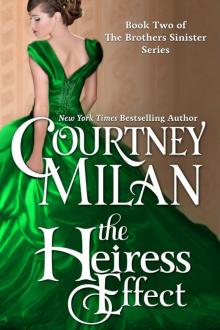 The Heiress Effect
The Heiress Effect Unraveled
Unraveled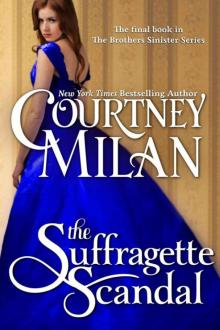 The Suffragette Scandal
The Suffragette Scandal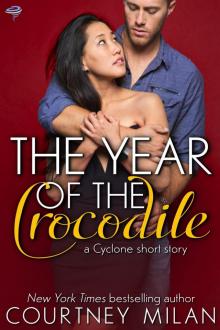 The Year of the Crocodile
The Year of the Crocodile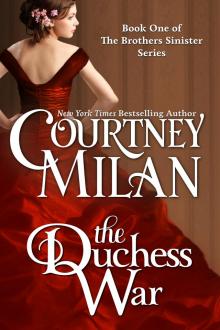 The Duchess War
The Duchess War What Happened at Midnight
What Happened at Midnight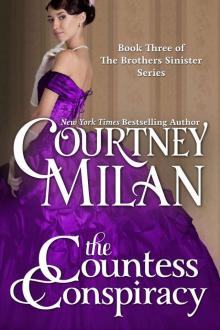 The Countess Conspiracy
The Countess Conspiracy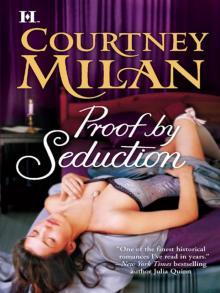 Proof by Seduction
Proof by Seduction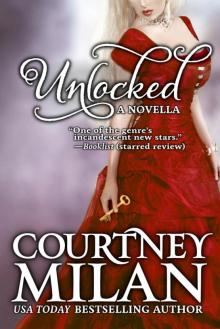 Unlocked
Unlocked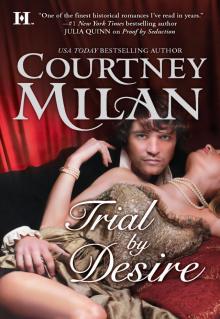 Trial by Desire
Trial by Desire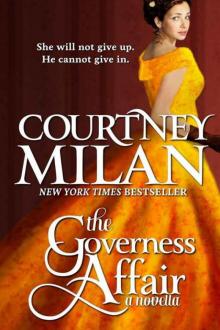 The Governess Affair
The Governess Affair Unveiled
Unveiled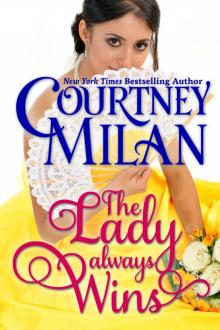 The Lady Always Wins
The Lady Always Wins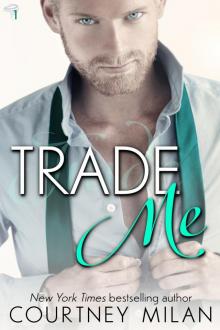 Trade Me
Trade Me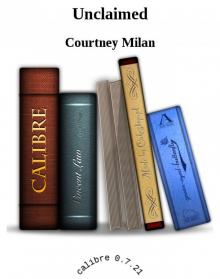 Unclaimed
Unclaimed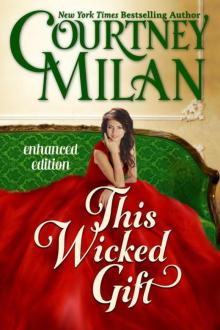 This Wicked Gift
This Wicked Gift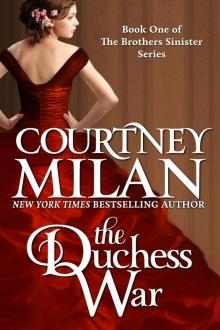 The Duchess War (The Brothers Sinister)
The Duchess War (The Brothers Sinister) Hamilton's Battalion: A Trio of Romances
Hamilton's Battalion: A Trio of Romances The Turner Series
The Turner Series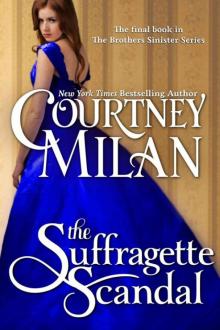 The Suffragette Scandal (The Brothers Sinister)
The Suffragette Scandal (The Brothers Sinister)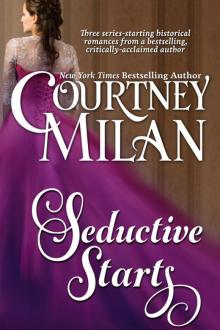 Seductive Starts
Seductive Starts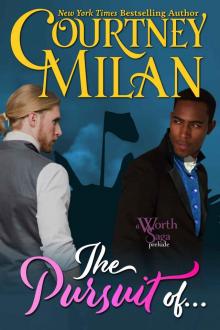 The Pursuit Of…
The Pursuit Of… Hamilton's Battalion
Hamilton's Battalion The Carhart Series
The Carhart Series Seven Wicked Nights
Seven Wicked Nights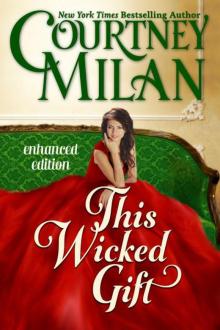 This Wicked Gift (A Carhart Series Novella)
This Wicked Gift (A Carhart Series Novella)